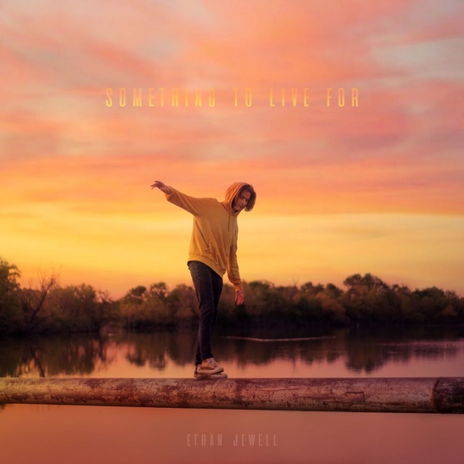Ethan Jewell, a nineteen-year-old TikTok poet, has now become an independent, mainstream, introspective poet and musical artist. As said in an article from Ethan’s bio, after “finding comfort in writing, the poet took to TikTok to share his art with the world in 2019, and the response was outstanding. From his first viral video of his original single ‘Snowglobe’ which received over 1.7 million views, to releasing a clip of ‘Bouquet,’ which saw even greater success with over 5.6 million views, Jewell had yet to slow his momentum.”
Ethan released his debut album called “Live from Planet Ok” in 2019. He “saw immediate success; securing over 1M streams within the first month of the release.” This album includes one of my favorite songs, “The King.” Next, he came out with his second album called “Living the Dream” in August 2020. “Which featured even more heart-wrenching lyricism and out-of-the-box styles. While releasing his songs, he kept to his roots, continuing with his TikTok endeavors; Jewell began to post more and more unreleased poetry and motivational and uplifting content. Breaking out of the norm to vocalize and normalize feelings and emotions is something he excels at.”
Ethan released another single, “It’s Getting Bad Again,” in December of 2020. “Receiving over 1.2 million views on the original viral video, the track highlights the physical symptoms that are often untalked about that come with mental health struggles. An immediate fan favorite, the track is his second most-streamed to date, acquiring over 2.2 million Spotify streams.” “In 2021, the artist has shown no sign of slowing down anytime soon. After receiving over 1.7 million views on TikTok and an abundance of fans and followers yearning for a release, Jewell kicked off 2021 with ‘drive thru poem,’ which gained him his first editorial placement on Spotify’s ‘idk.’ playlist.”
Today, Ethan Jewell sat down with me over Zoom to discuss his newest single which was released on August 20, called “something to live for,” and about his advocacy for mental health on social media.
Holley Petrie Q: Okay, Ethan, Let’s start at the beginning! Why Tiktok? You are writing from such a vulnerable place. Why open yourself up on such a popular app that can sometimes turn toxic?
Ethan Jewell A: “When I first started TikTok, a friend told me to try it to help me get over a relationship. So I downloaded TikTok and started posting random videos, thirst traps, and other fun stuff. Then about two months later, I started posting my poetry there. I understand there is fear like you mention, that the app can be toxic. I’ve received plenty of comments from people doubting the music, judging it and calling me names. Men have even told me that I’m lacking testosterone because I am in touch with my emotions. It can be really gross and brutal. I think a lot of the toxicity on the apps comes from other people not understanding themselves or understanding others. But there can be beauty to being vulnerable in a toxic environment. One of my big hopes of posting my music and poetry on TikTok is that it will allow people to understand that vulnerability, and I hope they can relate to it.”
Q: Yes, I also agree that being vulnerable is about being one-hundred percent you and not putting on a mask to save face or glamorize your outside persona. I’ve also had my fair share of toxic comments on TikTok, so I admire your strength in overlooking those comments and continuing to be vulnerable, and not changing who you are. Through your music, your fans know you have gone through dark periods. Will you tell me how you came out of those dark periods and some of the coping mechanisms that you learned to keep yourself above water?
A: “I’ve been going through dark periods on and off for the past few years. I would say I am actively in one right now, but I do have some coping mechanisms that I’ve learned that work for me. I think the one crucial thing to point out here is that there is no one cure-all or a solvable-all coping mechanism. It’s different for everybody. But I have found there are a few things that work for me. I will always try to remove myself from whatever situation I am in.” Ethan will take time alone when needed in any situation. “If I am hit with a wave of depression, I will take time for myself, lay down, and listen to music. The most important part of taking care of your mental health is to be patient with yourself. So many people try to rush the process; they get frustrated if they go to one therapy appointment and are not instantly cured or if their self-help books don’t work immediately. I’ve been going to therapy for the past two months straight, but I have gone on and off over the years. It is challenging and exhausting but worth it.”
Q: I agree with everything you just said. Music can be my escape to calm me down, boost me up or just to coincide with how I am feeling. My readers don’t know this yet, but I will be vulnerable here with you, I just began therapy this summer. I know that it will be a long and exhausting process, but I too believe it will be worth it. Thank you for talking about your own mental health issues. To continue, as you began your poetry journey, did you have in mind an inspiration or style you wanted to follow?
A: “I had a very specific inspiration. I can narrow it down even to the song. The song is ‘Creve Core 1’ by Hobo Johnson. It was the first time I had ever heard spoken word music. It’s a beautiful piece. It is just piano and Hobo Johnson speaking. ‘Creve Core 1’ is a beautiful story about a girl struggling in life. I remember hearing that song and thinking to myself, I want to create something like this; it was so powerful and moving. I think the song just shuffled randomly on Spotify one day…it was meant to be. I just latched onto that concept, and I think that same night I wrote ‘Snowglobe,’ the first poem I ever wrote.”
Q: I love your style, it’s so beautiful and unique. When I first heard your music, I was like, “huh, interesting,” but then it grew on me so much, and I vibe out to your music now every day. Speaking of “Snowglobe,” I wondered if you can tell me how you felt when you started gaining traction on TikTok, especially when “Snowglobe” became such a hit?
A: “It is very hard to describe how I felt when everything started gaining traction. It was really an avalanche effect. ‘Snowglobe’ blew up, then a couple of weeks later ‘Bouquet’ blew up; that was the big one, and it grew from there. I think ‘Snowglobe’ accumulated seventy thousand likes, which is a lot even now. My videos now hardly reach those numbers. Social media is built around instant gratification and releasing dopamine. When you get a like or notification, you get a little bit of dopamine. So receiving that in such a large quantity from TikTok all at once was overwhelming. It is like nothing I’d ever felt before. This may sound silly, like ‘oh, it’s just an app,’ but when you think about it, that is thousands and thousands of real people who were giving feedback on something that I created so close to my heart.”
Q: I think “Snowglobe” is so relatable to people who need a sad song to sit with like a friend. Thank you for writing it! How did your parents feel about your journey? Did they accept what you were doing or were they like, “you need a stable job?”
A: “Something that I think a lot of artists struggle with is their parents supporting their journey. As you said, ‘you need a stable job’ is a very common thing to hear. I have been very, very lucky to not experience it; my parents have been my number one fans since day one. My Dad is my producer; he’s been making music his whole life. So when I told him I was making music, you should have seen the joy on his face, to be able to share something important with his son. It is funny that the only reason I ever released music was that my Dad overheard me playing ‘Sunset,’ a song on my discography. I was in my room one night practicing the chords, and he knocked on the door and came into my room. He said, ‘Did you write that?’ I was nervous because I hadn’t shared my music with anyone at this point. I said, ‘yeah, I did.’ He then locked eyes with me and said, ‘Ethan we have to record this!’ My parents have been super supportive. They have been an inspiration to me and have kept me going. I can’t thank them enough.”
Q: You said your Dad is your producer. Is he in the music business?
A: “My Dad makes music as a hobby. He’s never done it professionally but still made a lot of music. Since we know each other so well, it’s a very open space for creative flow; it is essential for this emotional music. So I can go into the room, create and then bounce ideas back and forth. It is really fun!”
Q: Last question, Ethan, can you tell me about the inspiration behind your newest single that dropped on August 20, and can you give me three words to describe the song?
A: “A friend of mine challenged me to write a happy song to which I begrudgingly agreed. I was in a dark place and didn’t want to write anything happy, but I decided to do it for them. Then, a few days later, I was watching a sunset and thought to myself, ‘wow, this is something to live for.’ And just like that, the concept was born. I began listing everything I live for and formed it into a song! This song is hopeful, heartwarming, and bittersweet.”
Holley Petrie: Thank you, and I appreciate you, Ethan, for sitting down with me today, and I see a very bright and successful future for you.
As this was my first interview, I was so fortunate that Ethan was such a down-to-earth, honest and easy person to speak with. I appreciate the way he opened up to me. I encourage you to go to Spotify and look up Ethan Jewell and give him a listen. Especially, go and stream his newest single, “something to live for.” I got an early listen and found it soothing and very relatable about the pain words can cause and the healing power of nature.


